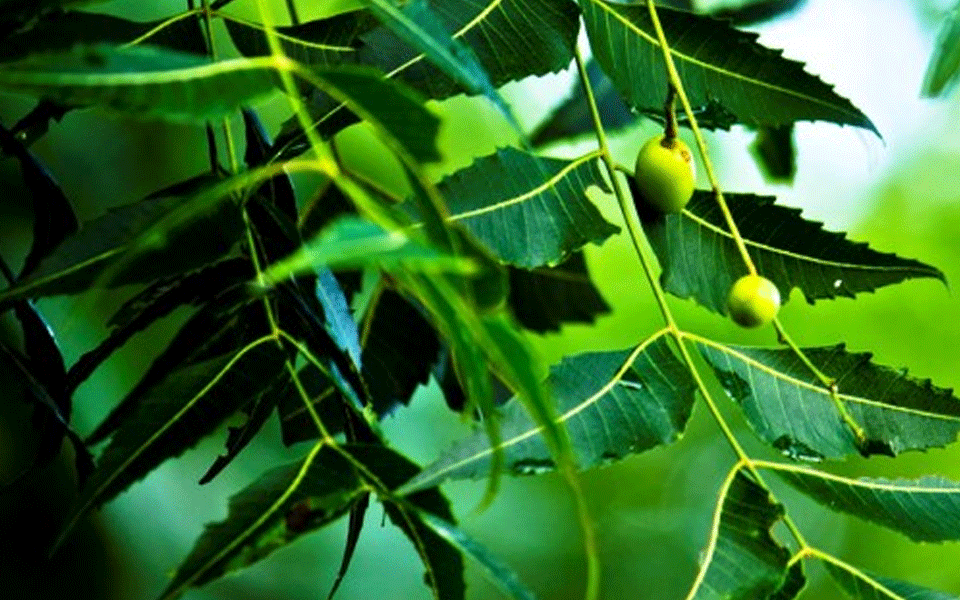New Delhi, Aug 2: Neem has been referred to as a "wonder herb" for the many beneficial properties it possesses. It has as many as 130 different biologically-active compounds that enhance the wellbeing of several body parts such as skin, hair and blood, among others.
This wonder herb is a cornerstone in preventive health remedies to achieve holistic wellness. During monsoon, there is an increased risk of infections, and your skin and hair also require extra care, all of which neem can help you with.
Dr Hariprasad, Ayurveda expert at The Himalaya Drug Company, elaborates on how neem has properties that can benefit various parts of our body.
Skin:

In Ayurveda, it's commonly known that neem is an incredibly effective acne combatant and is often associated with naturally beautiful, glowing skin. During the monsoon, the sebaceous glands that are responsible for producing body oils and regulating perspiration, go into overdrive due to the increased humidity. This can lead to breakouts and oily skin. The anti-bacterial properties of neem have a positive impact on any pimples or black/whiteheads. The harmful effects of bacteria that cause these breakouts are nullified by the anti-inflammatory properties of neem. Mild skin problems like rashes, irritation, burns and infections can also be healed with this herb.
Hair:

Dandruff and dry scalp can also be treated with neem. The change in weather can affect your scalp's pH balance, making your hair oily, frizzy or dandruff-prone, depending on your skin type. Because of the antibacterial properties of neem, a dry scalp and dandruff can be tackled. Dandruff, much like acne, can be significantly reduced with the purifying properties of neem. It can also be used to strengthen hair and prevent hair fall.
Blood Purification:

The changing seasons are said to have a huge impact on the body and, compounded with unfavorable diet and lifestyle, leads to a build-up of toxins in the body. Ayurveda recommends cleansing of blood as a healthy measure against the toxin build-up, to boost immunity, prevent infections and promote overall well-being. Neem, which is rich in natural antioxidants, and has other medicinal properties, is traditionally known to be a very effective blood purifier. It is also known to support key organs - the liver and kidney -- that assist in taking out waste and toxins from the body. Neem also helps to promote blood circulation by supporting healthy dilatation of blood vessels. Regular intake has also been useful in controlling high blood sugar and regulating blood pressure.
Intestinal health/Digestive wellness:
A healthy digestive system is extremely important for one's overall health. Prevention is always better than cure, and neem is very beneficial in maintaining and supporting a healthy digestive system. During monsoon, the integrity of your food, especially leafy vegetables, is compromised. This often leads to stomach issues and infections or parasites. The herb can be used to treat intestinal worms, nausea, belching and phlegm. The anti-inflammatory properties of neem make it incredibly useful for intestinal health as it soothes the entire digestive system. It is a great immunity booster and its regular use can help one feel naturally energised.
Oral health:
Neem is used as an active ingredient in many toothpastes and mouthwashes and can also be used to treat toothaches. During monsoon, complaints about sensitive teeth increase due to the cold air and changing weather. Neem helps stave off gingivitis and suppress swelling and inflammation of the gums. In many places, neem twigs are chewed as a natural substitute for brushing teeth; this is because it is a natural oral deodorant with antibacterial properties. The antimicrobial and antifungal properties present help minimise plaque build-up and reduce the presence of bacteria associated with tartar and gum diseases.
There are multiple reasons to incorporate neem into your life, but these are some areas where it is known to have incredibly positive effects. This monsoon, take that extra step to prevent seasonal health issues. A natural road to health and wellness can start with bringing neem into your life in a significant way.
Let the Truth be known. If you read VB and like VB, please be a VB Supporter and Help us deliver the Truth to one and all.
Ghaziabad (UP) (PTI): Three minor sisters died after allegedly jumping off the balcony of a ninth-floor flat in Ghaziabad early on Wednesday, police said.
Assistant Commissioner of Police (Shalimar Garden) Atul Kumar Singh said the police received information around 2.15 am about three girls jumping off the balcony of the ninth-floor apartment in a tower of Bharat City, located under the Teela Mor police station area.
On reaching the spot, the police found that the girls - Nishika (16), Prachi (14) and Pakhi (12) - daughters of Chetan Kumar, had fallen to the ground floor and suffered fatal injuries, the ACP said.
They were rushed by ambulance to a hospital in Loni, where doctors declared them dead on arrival, he added.
The police have initiated legal formalities and are investigating the circumstances leading to the incident, officials said.
(Assistance for overcoming suicidal thoughts is available on the state’s health helpline 104, Tele-MANAS 14416.)





